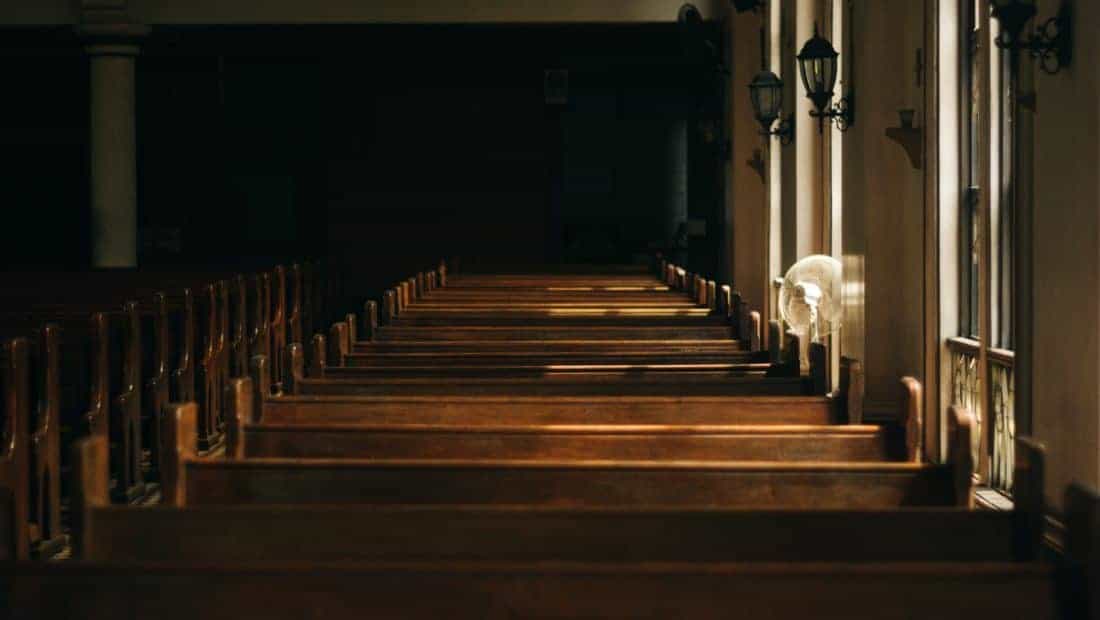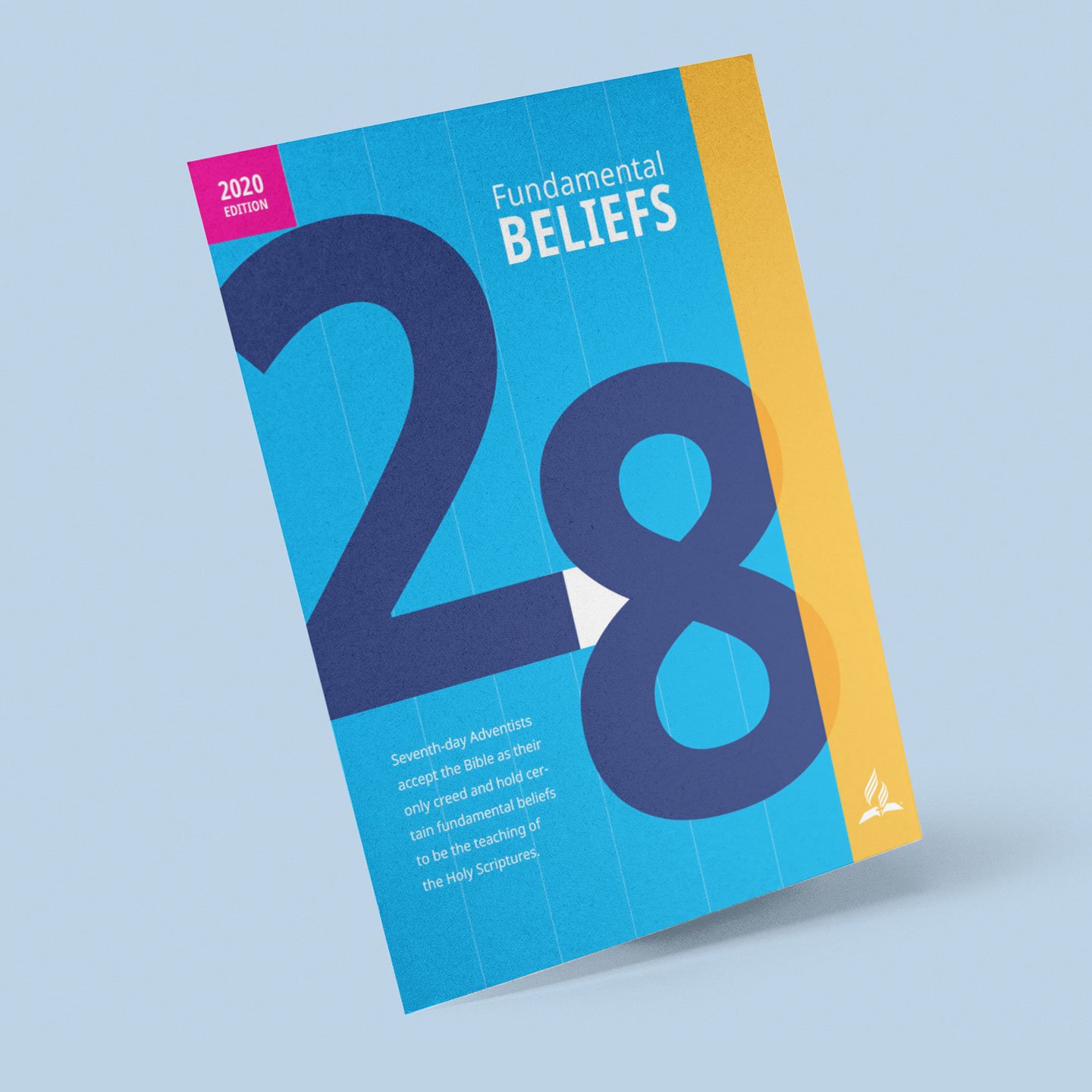What do Adventists Believe?

Upholding the Protestant conviction of Sola Scriptura (“Bible only”), these 28 Fundamental Beliefs describe how Seventh-day Adventists interpret Scripture for daily application.
Seventh-day Adventists accept the Bible as their only creed and hold certain fundamental beliefs to be the teaching of the Holy Scriptures. These beliefs, as set forth here, constitute the church’s understanding and expression of the teaching of Scripture.
Revision of these statements may be expected at a quinquennial General Conference Session whenever the church is led by the Holy Spirit to a fuller understanding of Bible truth, or if better language is found to express these teachings of God’s Holy Word.
The expression of these concepts help provide an overall picture of what this Christian denomination collectively believes and practices. Together, these teachings reveal a God who is the architect of the world. In wisdom, grace and infinite love, He is actively working to restore a relationship with humanity that will last for eternity.
The 28 Fundamental Beliefs can be organized into six categories of doctrine:
Humanity
Salvation
Church
Daily Living


GOD
Our Creator God is love, power and splendor. He is three-in-one, mysterious and infinite—yet He desires an intimate connection with humanity. He gave us the Bible as His Holy Word, so we could learn more about Him and build a relationship with Him.
The following statements describe what the Seventh-day Adventist Church believes about God and His Word.
1. Holy Scriptures
The Holy Scriptures, Old and New Testaments, are the written Word of God, given by divine inspiration.
The inspired authors spoke and wrote as they were moved by the Holy Spirit. In this Word, God has committed to humanity the knowledge necessary for salvation.
The Holy Scriptures are the supreme, authoritative, and the infallible revelation of His will. They are the standard of character, the test of experience, the definitive revealer of doctrines, and the trustworthy record of God’s acts in history.
(Ps. 119:105; Prov. 30:5, 6; Isa. 8:20; John 17:17; 1 Thess. 2:13; 2 Tim. 3:16, 17; Heb. 4:12; 2 Peter 1:20, 21.)
2. The Trinity
There is one God: Father, Son, and Holy Spirit, a unity of three coeternal Persons.
God is immortal, all-powerful, all-knowing, above all, and ever present. He is infinite and beyond human comprehension, yet known through His self-revelation.
God, who is love, is forever worthy of worship, adoration, and service by the whole creation.
(Gen. 1:26; Deut. 6:4; Isa. 6:8; Matt. 28:19; John 3:16; 2 Cor. 1:21, 22; 13:14; Eph. 4:4-6; 1 Peter 1:2.)
3. God the Father
God the eternal Father is the Creator, Source, Sustainer, and Sovereign of all creation. He is just and holy, merciful and gracious, slow to anger, and abounding in steadfast love and faithfulness.
The qualities and powers exhibited in the Son and the Holy Spirit are also those of the Father.
(Gen. 1:1; Deut. 4:35; Ps. 110:1, 4; John 3:16; 14:9; 1 Cor. 15:28; 1 Tim. 1:17; 1 John 4:8; Rev. 4:11.)
4. God the Son
God the eternal Son became incarnate in Jesus Christ. Through Him all things were created, the character of God is revealed, the salvation of humanity is accomplished, and the world is judged.
Forever truly God, He became also truly human, Jesus the Christ. He was conceived of the Holy Spirit and born of the virgin Mary. He lived and experienced temptation as a human being, but perfectly exemplified the righteousness and love of God.
By His miracles He manifested God’s power and was attested as God’s promised Messiah. He suffered and died voluntarily on the cross for our sins and in our place, was raised from the dead, and ascended to heaven to minister in the heavenly sanctuary on our behalf.
He will come again in glory for the final deliverance of His people and the restoration of all things.
(Isa. 53:4-6; Dan. 9:25-27; Luke 1:35; John 1:1-3, 14; 5:22; 10:30; 14:1–3, 9, 13; Rom. 6:23; 1 Cor. 15:3, 4; 2 Cor. 3:18; 5:17-19; Phil. 2:5–11; Col. 1:15-19; Heb. 2:9-18; 8:1, 2.)
5. God the Holy Spirit
God the eternal Spirit was active with the Father and the Son in Creation, incarnation, and redemption.
He is as much a person as are the Father and the Son. He inspired the writers of Scripture. He filled Christ’s life with power. He draws and convicts human beings; and those who respond He renews and transforms into the image of God.
Sent by the Father and the Son to be always with His children, He extends spiritual gifts to the church, empowers it to bear witness to Christ, and in harmony with the Scriptures leads it into all truth.
(Gen. 1:1, 2; 2 Sam. 23:2; Ps. 51:11; Isa. 61:1; Luke 1:35; 4:18; John 14:16-18, 26; 15:26; 16:7-13; Acts 1:8; 5:3; 10:38; Rom. 5:5; 1 Cor. 12:7-11; 2 Cor. 3:18; 2 Peter 1:21.)


HUMANITY
Lovingly designed as perfect beings, God created humans in His own image with free will and dominion over the earth. But sin crept in through temptation by Satan, the Devil. Now humanity’s perfection is tarnished, our bodies and minds corrupted. Our once-idyllic world continues to be in a constant struggle between good and evil.
Fortunately, God had a plan to redeem humanity through His Son, Jesus Christ. He will ultimately have victory over sin and death and restore us and our earth to its original state of beauty and perfection.
The following statements describe what the Seventh-day Adventist Church believes about the earth and humanity in the context of God’s ultimate plan.
6. Creation
God has revealed in Scripture the authentic and historical account of His creative activity. He created the universe, and in a recent six-day creation the Lord made “the heavens and the earth, the sea, and all that is in them” and rested on the seventh day.
Thus He established the Sabbath as a perpetual memorial of the work He performed and completed during six literal days that together with the Sabbath constituted the same unit of time that we call a week today.
The first man and woman were made in the image of God as the crowning work of Creation, given dominion over the world, and charged with responsibility to care for it. When the world was finished it was “very good,” declaring the glory of God.
(Gen. 1-2; 5; 11; Exod. 20:8-11; Ps. 19:1–6; 33:6, 9; 104; Isa. 45:12, 18; Acts 17:24; Col. 1:16; Heb. 1:2; 11:3; Rev. 10:6; 14:7.)
7. Nature of Humanity
Man and woman were made in the image of God with individuality, the power and freedom to think and to do. Though created free beings, each is an indivisible unity of body, mind, and spirit, dependent upon God for life and breath and all else.
When our first parents disobeyed God, they denied their dependence upon Him and fell from their high position. The image of God in them was marred and they became subject to death.
Their descendants share this fallen nature and its consequences. They are born with weaknesses and tendencies to evil. But God in Christ reconciled the world to Himself and by His Spirit restores in penitent mortals the image of their Maker. Created for the glory of God, they are called to love Him and one another, and to care for their environment.
(Gen. 1:26-28; 2:7, 15; 3; Ps. 8:4-8; 51:5, 10; 58:3; Jer. 17:9; Acts 17:24-28; Rom. 5:12-17; 2 Cor. 5:19, 20; Eph. 2:3; 1 Thess. 5:23; 1 John 3:4; 4:7, 8, 11, 20.)


SALVATION
Even before the creation of the earth, there was war between good and evil. Lucifer, a once-perfect and highly-regarded being, became jealous of God and wished for higher position. When God did not give him what he wanted, He became Satan. He accused God of being unfair.
Satan then led astray one-third of heaven’s angels, and God had to cast them out. To seek revenge on God, Satan began attacking His precious new creation—the earth. Knowing that humans were created with free will, He tempted them to rebel against God’s loving guidance.
But God knew this didn’t have to be the end of humanity’s story. He demonstrated just how much He loves us by sending His own Son, Jesus Christ, to die in humanity’s place, to bear the ultimate punishment sin brings (Romans 6:23, John 3:16).
However, it still comes down to choice. God never wanted forced allegiance. The option is ours. We can succumb to sin and choose to live for ourselves, or we can choose to accept Jesus’ sacrifice, follow Him, and get to know Him. And if we choose Him, He promises to guide us with His Holy Spirit and will never forsake us.
The following statements describe what the Seventh-day Adventist Church believes about the struggle between good and evil, and how there is still hope for humanity’s salvation through the loving sacrifice of Jesus Christ.
8. The Great Controversy
All humanity is now involved in a great controversy between Christ and Satan regarding the character of God, His law, and His sovereignty over the universe.
This conflict originated in heaven when a created being, endowed with freedom of choice, in self-exaltation became Satan, God’s adversary, and led into rebellion a portion of the angels. He introduced the spirit of rebellion into this world when he led Adam and Eve into sin.
This human sin resulted in the distortion of the image of God in humanity, the disordering of the created world, and its eventual devastation at the time of the global flood, as presented in the historical account of Genesis 1-11.
Observed by the whole creation, this world became the arena of the universal conflict, out of which the God of love will ultimately be vindicated. To assist His people in this controversy, Christ sends the Holy Spirit and the loyal angels to guide, protect, and sustain them in the way of salvation.
(Gen. 3; 6-8; Job 1:6-12; Isa. 14:12-14; Ezek. 28:12-18; Rom. 1:19-32; 3:4; 5:12-21; 8:19-22; 1 Cor. 4:9; Heb. 1:14; 1 Peter 5:8; 2 Peter 3:6; Rev. 12:4-9.)
9. The Life, Death and Resurrection of Christ
In Christ’s life of perfect obedience to God’s will, His suffering, death, and resurrection, God provided the only means of atonement for human sin, so that those who by faith accept this atonement may have eternal life, and the whole creation may better understand the infinite and holy love of the Creator.
This perfect atonement vindicates the righteousness of God’s law and the graciousness of His character; for it both condemns our sin and provides for our forgiveness.
The death of Christ is substitutionary and expiatory, reconciling and transforming. The bodily resurrection of Christ proclaims God’s triumph over the forces of evil, and for those who accept the atonement, assures their final victory over sin and death. It declares the Lordship of Jesus Christ, before whom every knee in heaven and on earth will bow.
(Gen. 3:15; Ps. 22:1; Isa. 53; John 3:16; 14:30; Rom. 1:4; 3:25; 4:25; 8:3, 4; 1 Cor. 15:3, 4, 20-22; 2 Cor. 5:14, 15, 19-21; Phil. 2:6-11; Col. 2:15; 1 Peter 2:21, 22; 1 John 2:2; 4:10.)
10. The Experience of Salvation
In infinite love and mercy God made Christ, who knew no sin, to be sin for us, so that in Him we might be made the righteousness of God.
Led by the Holy Spirit we sense our need, acknowledge our sinfulness, repent of our transgressions, and exercise faith in Jesus as Saviour and Lord, Substitute and Example. This saving faith comes through the divine power of the Word and is the gift of God’s grace.
Through Christ we are justified, adopted as God’s sons and daughters, and delivered from the lordship of sin. Through the Spirit we are born again and sanctified; the Spirit renews our minds, writes God’s law of love in our hearts, and we are given the power to live a holy life.
Abiding in Him we become partakers of the divine nature and have the assurance of salvation now and in the judgment.
(Gen. 3:15; Isa. 45:22; 53; Jer. 31:31-34; Ezek. 33:11; 36:25-27; Hab. 2:4; Mark 9:23, 24; John 3:3-8, 16; 16:8; Rom. 3:21-26; 8:1-4, 14-17; 5:6-10; 10:17; 12:2; 2 Cor. 5:17-21; Gal. 1:4; 3:13, 14, 26; 4:4-7; Eph. 2:4-10; Col. 1:13, 14; Titus 3:3-7; Heb. 8:7-12; 1 Peter 1:23; 2:21, 22; 2 Peter 1:3, 4; Rev. 13:8.)
11. Growing in Christ
By His death on the cross, Jesus triumphed over the forces of evil. He who subjugated the demonic spirits during His earthly ministry has broken their power and made certain their ultimate doom.
Jesus’ victory gives us victory over the evil forces that still seek to control us, as we walk with Him in peace, joy, and assurance of His love. Now the Holy Spirit dwells within us and empowers us. Continually committed to Jesus as our Saviour and Lord, we are set free from the burden of our past deeds.
No longer do we live in the darkness, fear of evil powers, ignorance, and meaninglessness of our former way of life. In this new freedom in Jesus, we are called to grow into the likeness of His character, communing with Him daily in prayer, feeding on His Word, meditating on it and on His providence, singing His praises, gathering together for worship, and participating in the mission of the Church.
We are also called to follow Christ’s example by compassionately ministering to the physical, mental, social, emotional, and spiritual needs of humanity. As we give ourselves in loving service to those around us and in witnessing to His salvation, His constant presence with us through the Spirit transforms every moment and every task into a spiritual experience.
(1 Chron. 29:11; Ps. 1:1, 2; 23:4; 77:11, 12; Matt. 20:25-28; 25:31-46; Luke 10:17-20; John 20:21; Rom. 8:38, 39; 2 Cor. 3:17, 18; Gal. 5:22-25; Eph. 5:19, 20; 6:12-18; Phil. 3:7-14; Col. 1:13, 14; 2:6, 14, 15; 1 Thess. 5:16-18, 23; Heb. 10:25; James 1:27; 2 Peter 2:9; 3:18; 1 John 4:4.)


CHURCH
After Jesus’ ministry on earth, He commissioned His followers to go about their lives telling others about His love and promise to return. In doing this, He also commanded to love all people as He loves all of us.
As imperfect as humanity is, God still gives us the privilege of being part of His work. In doing this, we are His Church, or the Body of Christ, all with different spiritual gifts to contribute. He encourages us to meet together, support one another, and serve together.
The following statements describe what the Seventh-day Adventist Church believes regarding the fellowship of believers around the world, God’s Great Commission, and the principles to guide organized local congregations.
12. The Church
The church is the community of believers who confess Jesus Christ as Lord and Saviour. In continuity with the people of God in Old Testament times, we are called out from the world; and we join together for worship, for fellowship, for instruction in the Word, for the celebration of the Lord’s Supper, for service to humanity, and for the worldwide proclamation of the gospel.
The church derives its authority from Christ, who is the incarnate Word revealed in the Scriptures. The church is God’s family; adopted by Him as children, its members live on the basis of the new covenant.
The church is the body of Christ, a community of faith of which Christ Himself is the Head. The church is the bride for whom Christ died that He might sanctify and cleanse her.
At His return in triumph, He will present her to Himself a glorious church, the faithful of all the ages, the purchase of His blood, not having spot or wrinkle, but holy and without blemish.
(Gen. 12:1-3; Exod. 19:3-7; Matt. 16:13-20; 18:18; 28:19, 20; Acts 2:38-42; 7:38; 1 Cor. 1:2; Eph. 1:22, 23; 2:19-22; 3:8-11; 5:23-27; Col. 1:17, 18; 1 Peter 2:9.)
13. The Remnant and its Mission
The universal church is composed of all who truly believe in Christ, but in the last days, a time of widespread apostasy, a remnant has been called out to keep the commandments of God and the faith of Jesus. This remnant announces the arrival of the judgment hour, proclaims salvation through Christ, and heralds the approach of His second advent.
This proclamation is symbolized by the three angels of Revelation 14; it coincides with the work of judgment in heaven and results in a work of repentance and reform on earth. Every believer is called to have a personal part in this worldwide witness.
(Dan. 7:9-14; Isa. 1:9; 11:11; Jer. 23:3; Mic. 2:12; 2 Cor. 5:10; 1 Peter 1:16-19; 4:17; 2 Peter 3:10-14; Jude 3, 14; Rev. 12:17; 14:6-12; 18:1-4.)
14. Unity in the Body of Christ
The church is one body with many members, called from every nation, kindred, tongue, and people.
In Christ we are a new creation; distinctions of race, culture, learning, and nationality, and differences between high and low, rich and poor, male and female, must not be divisive among us. We are all equal in Christ, who by one Spirit has bonded us into one fellowship with Him and with one another; we are to serve and be served without partiality or reservation.
Through the revelation of Jesus Christ in the Scriptures we share the same faith and hope, and reach out in one witness to all. This unity has its source in the oneness of the triune God, who has adopted us as His children.
(Ps. 133:1; Matt. 28:19, 20; John 17:20-23; Acts 17:26, 27; Rom. 12:4, 5; 1 Cor. 12:12-14; 2 Cor. 5:16, 17; Gal. 3:27-29; Eph. 2:13-16; 4:3-6, 11-16; Col. 3:10-15.)
15. Baptism
By baptism we confess our faith in the death and resurrection of Jesus Christ, and testify of our death to sin and of our purpose to walk in newness of life. Thus we acknowledge Christ as Lord and Saviour, become His people, and are received as members by His church.
Baptism is a symbol of our union with Christ, the forgiveness of our sins, and our reception of the Holy Spirit.
It is by immersion in water and is contingent on an affirmation of faith in Jesus and evidence of repentance of sin. It follows instruction in the Holy Scriptures and acceptance of their teachings.
(Matt. 28:19, 20; Acts 2:38; 16:30-33; 22:16; Rom. 6:1-6; Gal. 3:27; Col. 2:12, 13.)
16. The Lord’s Supper (Communion)
The Lord’s Supper is a participation in the emblems of the body and blood of Jesus as an expression of faith in Him, our Lord and Saviour.
In this experience of communion Christ is present to meet and strengthen His people. As we partake, we joyfully proclaim the Lord’s death until He comes again.
Preparation for the Supper includes self-examination, repentance, and confession. The Master ordained the service of foot-washing to signify renewed cleansing, to express a willingness to serve one another in Christlike humility, and to unite our hearts in love.
The communion service is open to all believing Christians.
(Matt. 26:17-30; John 6:48-63; 13:1-17; 1 Cor. 10:16, 17; 11:23-30; Rev. 3:20.)


DAILY LIVING
All throughout the Bible we can find guidance for our daily lives. A well-known example would be the Ten Commandments in Exodus, where we are shown how to love God and how to love people—which Jesus re-emphasized in the New Testament (Matthew 22:37-40). God’s law shows us the path to follow and the pitfalls to avoid, leading us toward wholeness and balance.
Additionally, by being a Christian and following God, we answer His call to be stewards of the earth until He returns. That also includes taking care of ourselves, caring for our minds and bodies which in turn nourishes our spirit.
The following statements describe what the Seventh-day Adventist Church believes about what it means to live each day as a follower of Christ.
17. Spiritual Gifts and Ministries
God bestows upon all members of His church in every age spiritual gifts that each member is to employ in loving ministry for the common good of the church and of humanity.
Given by the agency of the Holy Spirit, who apportions to each member as He wills, the gifts provide all abilities and ministries needed by the church to fulfill its divinely ordained functions.
According to the Scriptures, these gifts include such ministries as faith, healing, prophecy, proclamation, teaching, administration, reconciliation, compassion, and self-sacrificing service and charity for the help and encouragement of people.
Some members are called of God and endowed by the Spirit for functions recognized by the church in pastoral, evangelistic, and teaching ministries particularly needed to equip the members for service, to build up the church to spiritual maturity, and to foster unity of the faith and knowledge of God.
When members employ these spiritual gifts as faithful stewards of God’s varied grace, the church is protected from the destructive influence of false doctrine, grows with a growth that is from God, and is built up in faith and love.
(Acts 6:1-7; Rom. 12:4-8; 1 Cor. 12:7-11, 27, 28; Eph. 4:8, 11-16; 1 Tim. 3:1-13; 1 Peter 4:10, 11.)
18. The Gift of Prophecy
The Scriptures testify that one of the gifts of the Holy Spirit is prophecy.
This gift is an identifying mark of the remnant church and we believe it was manifested in the ministry of Ellen G. White. Her writings speak with prophetic authority and provide comfort, guidance, instruction, and correction to the church.
They also make clear that the Bible is the standard by which all teaching and experience must be tested.
(Num. 12:6; 2 Chron. 20:20; Amos 3:7; Joel 2:28, 29; Acts 2:14-21; 2 Tim. 3:16, 17; Heb. 1:1-3; Rev. 12:17; 19:10; 22:8, 9.)
19. The Law of God
The great principles of God’s law are embodied in the Ten Commandments and exemplified in the life of Christ. They express God’s love, will, and purposes concerning human conduct and relationships and are binding upon all people in every age.
These precepts are the basis of God’s covenant with His people and the standard in God’s judgment. Through the agency of the Holy Spirit they point out sin and awaken a sense of need for a Saviour.
Salvation is all of grace and not of works, and its fruit is obedience to the Commandments.
This obedience develops Christian character and results in a sense of well-being. It is evidence of our love for the Lord and our concern for our fellow human beings. The obedience of faith demonstrates the power of Christ to transform lives, and therefore strengthens Christian witness.
(Exod. 20:1-17; Deut. 28:1-14; Ps. 19:7-14; 40:7, 8; Matt. 5:17-20; 22:36-40; John 14:15; 15:7-10; Rom. 8:3, 4; Eph. 2:8-10; Heb. 8:8-10; 1 John 2:3; 5:3; Rev. 12:17; 14:12.)
20. Sabbath
The gracious Creator, after the six days of Creation, rested on the seventh day and instituted the Sabbath for all people as a memorial of Creation.
The fourth commandment of God’s unchangeable law requires the observance of this seventh-day Sabbath as the day of rest, worship, and ministry in harmony with the teaching and practice of Jesus, the Lord of the Sabbath.
The Sabbath is a day of delightful communion with God and one another. It is a symbol of our redemption in Christ, a sign of our sanctification, a token of our allegiance, and a foretaste of our eternal future in God’s kingdom.
The Sabbath is God’s perpetual sign of His eternal covenant between Him and His people. Joyful observance of this holy time from evening to evening, sunset to sunset, is a celebration of God’s creative and redemptive acts.
(Gen. 2:1-3; Exod. 20:8-11; 31:13-17; Lev. 23:32; Deut. 5:12-15; Isa. 56:5, 6; 58:13, 14; Ezek. 20:12, 20; Matt. 12:1-12; Mark 1:32; Luke 4:16; Heb. 4:1-11.)
21. Stewardship
We are God’s stewards, entrusted by Him with time and opportunities, abilities and possessions, and the blessings of the earth and its resources. We are responsible to Him for their proper use.
We acknowledge God’s ownership by faithful service to Him and our fellow human beings, and by returning tithe and giving offerings for the proclamation of His gospel and the support and growth of His church.
Stewardship is a privilege given to us by God for nurture in love and the victory over selfishness and covetousness. Stewards rejoice in the blessings that come to others as a result of their faithfulness.
(Gen. 1:26-28; 2:15; 1 Chron. 29:14; Haggai 1:3-11; Mal. 3:8-12; Matt. 23:23; Rom. 15:26, 27; 1 Cor. 9:9-14; 2 Cor. 8:1-15; 9:7.)
22. Christian Behavior
We are called to be a godly people who think, feel, and act in harmony with biblical principles in all aspects of personal and social life.
For the Spirit to recreate in us the character of our Lord we involve ourselves only in those things that will produce Christlike purity, health, and joy in our lives. This means that our amusement and entertainment should meet the highest standards of Christian taste and beauty.
While recognizing cultural differences, our dress is to be simple, modest, and neat, befitting those whose true beauty does not consist of outward adornment but in the imperishable ornament of a gentle and quiet spirit.
It also means that because our bodies are the temples of the Holy Spirit, we are to care for them intelligently. Along with adequate exercise and rest, we are to adopt the most healthful diet possible and abstain from the unclean foods identified in the Scriptures. Since alcoholic beverages, tobacco, and the irresponsible use of drugs and narcotics are harmful to our bodies, we are to abstain from them as well.
Instead, we are to engage in whatever brings our thoughts and bodies into the discipline of Christ, who desires our wholesomeness, joy, and goodness.
(Gen. 7:2; Exod. 20:15; Lev. 11:1-47; Ps. 106:3; Rom. 12:1, 2; 1 Cor. 6:19, 20; 10:31; 2 Cor. 6:14-7:1; 10:5; Eph. 5:1-21; Phil. 2:4; 4:8; 1 Tim. 2:9, 10; Titus 2:11, 12; 1 Peter 3:1-4; 1 John 2:6; 3 John 2.)
23. Marriage and the Family
Marriage was divinely established in Eden and affirmed by Jesus to be a lifelong union between a man and a woman in loving companionship.
For the Christian a marriage commitment is to God as well as to the spouse, and should be entered into only between a man and a woman who share a common faith. Mutual love, honor, respect, and responsibility are the fabric of this relationship, which is to reflect the love, sanctity, closeness, and permanence of the relationship between Christ and His church.
Regarding divorce, Jesus taught that the person who divorces a spouse, except for fornication, and marries another, commits adultery. Although some family relationships may fall short of the ideal, a man and a woman who fully commit themselves to each other in Christ through marriage may achieve loving unity through the guidance of the Spirit and the nurture of the church.
God blesses the family and intends that its members shall assist each other toward complete maturity. Increasing family closeness is one of the earmarks of the final gospel message.
Parents are to bring up their children to love and obey the Lord. By their example and their words they are to teach them that Christ is a loving, tender, and caring guide who wants them to become members of His body, the family of God which embraces both single and married persons.
(Gen. 2:18-25; Exod. 20:12; Deut. 6:5-9; Prov. 22:6; Mal. 4:5, 6; Matt. 5:31, 32; 19:3-9, 12; Mark 10:11, 12; John 2:1-11; 1 Cor. 7:7, 10, 11; 2 Cor. 6:14; Eph. 5:21-33; 6:1-4.)


RESTORATION (END TIMES)
God has always investigated before taking action, demonstrating His willingness to forgive and giving each one of us a chance to be part of His plan. We saw this to be true with the Garden of Eden, the Tower of Babel, the exodus from Egypt and the destruction of Sodom and Gomorrah.
Before Jesus’ Second Coming, He is investigating the entire earth, everyone who has ever lived, every choice every human being has made. God wants it to be clear to us, and to the watching universe, that not one person will experience a fate they did not choose.
Christ’s return is near, meaning the final judgment of humanity, the destruction of the wicked, the end of death and sin, and the redemption of those who accept the gift of God’s salvation. And that’s not the end of the story. We will enjoy a millennium in heaven and the restoration of our earth to the paradise it once was, for us to enjoy for eternity while communing face to face with God.
The following statements describe what the Seventh-day Adventist Church believes about the end times of the earth, and what’s in store for humanity as eternity unfolds.
24. Christ’s Ministry in the Heavenly Sanctuary
There is a sanctuary in heaven, the true tabernacle that the Lord set up and not humans. In it Christ ministers on our behalf, making available to believers the benefits of His atoning sacrifice offered once for all on the cross.
At His ascension, He was inaugurated as our great High Priest and began His intercessory ministry, which was typified by the work of the high priest in the holy place of the earthly sanctuary.
In 1844, at the end of the prophetic period of 2300 days, He entered the second and last phase of His atoning ministry, which was typified by the work of the high priest in the most holy place of the earthly sanctuary.
It is a work of investigative judgment, which is part of the ultimate disposition of all sin, typified by the cleansing of the ancient Hebrew sanctuary on the Day of Atonement. In that typical service the sanctuary was cleansed with the blood of animal sacrifices, but the heavenly things are purified with the perfect sacrifice of the blood of Jesus.
The investigative judgment reveals to heavenly intelligences who among the dead are asleep in Christ and therefore, in Him, are deemed worthy to have part in the first resurrection.
It also makes manifest who among the living are abiding in Christ, keeping the commandments of God and the faith of Jesus, and in Him, therefore, are ready for translation into His everlasting kingdom.
This judgment vindicates the justice of God in saving those who believe in Jesus. It declares that those who have remained loyal to God shall receive the kingdom. The completion of this ministry of Christ will mark the close of human probation before the Second Advent.
(Lev. 16; Num. 14:34; Ezek. 4:6; Dan. 7:9-27; 8:13, 14; 9:24-27; Heb. 1:3; 2:16, 17; 4:14-16; 8:1-5; 9:11- 28; 10:19-22; Rev. 8:3-5; 11:19; 14:6, 7; 20:12; 14:12; 22:11, 12.)
25. The Second Coming of Christ
The second coming of Christ is the blessed hope of the church, the grand climax of the gospel.
The Saviour’s coming will be literal, personal, visible, and worldwide. When He returns, the righteous dead will be resurrected, and together with the righteous living will be glorified and taken to heaven, but the unrighteous will die.
The almost complete fulfillment of most lines of prophecy, together with the present condition of the world, indicates that Christ’s coming is near. The time of that event has not been revealed, and we are therefore exhorted to be ready at all times.
(Matt. 24; Mark 13; Luke 21; John 14:1-3; Acts 1:9-11; 1 Cor. 15:51-54; 1 Thess. 4:13-18; 5:1-6; 2 Thess. 1:7- 10; 2:8; 2 Tim. 3:1-5; Titus 2:13; Heb. 9:28; Rev. 1:7; 14:14-20; 19:11-21.)
26. Death and Resurrection
The wages of sin is death. But God, who alone is immortal, will grant eternal life to His redeemed.
Until that day death is an unconscious state for all people. When Christ, who is our life, appears, the resurrected righteous and the living righteous will be glorified and caught up to meet their Lord.
The second resurrection, the resurrection of the unrighteous, will take place a thousand years later.
(Job 19:25-27; Ps. 146:3, 4; Eccl. 9:5, 6, 10; Dan. 12:2, 13; Isa. 25:8; John 5:28, 29; 11:11-14; Rom. 6:23; 16; 1 Cor. 15:51-54; Col. 3:4; 1 Thess. 4:13-17; 1 Tim. 6:15; Rev. 20:1-10.)
27. The Millennium and the End of Sin
The millennium is the thousand-year reign of Christ with His saints in heaven between the first and second resurrections.
During this time the wicked dead will be judged; the earth will be utterly desolate, without living human inhabitants, but occupied by Satan and his angels.
At its close Christ with His saints and the Holy City will descend from heaven to earth. The unrighteous dead will then be resurrected, and with Satan and his angels will surround the city; but fire from God will consume them and cleanse the earth.
The universe will thus be freed of sin and sinners forever.
(Jer. 4:23-26; Ezek. 28:18, 19; Mal. 4:1; 1 Cor. 6:2, 3; Rev. 20; 21:1-5.)
28. The New Earth
On the new earth, in which righteousness dwells, God will provide an eternal home for the redeemed and a perfect environment for everlasting life, love, joy, and learning in His presence. For here God Himself will dwell with His people, and suffering and death will have passed away.
The great controversy will be ended, and sin will be no more. All things, animate and inanimate, will declare that God is love; and He shall reign forever. Amen.
(Isa. 35; 65:17-25; Matt. 5:5; 2 Peter 3:13; Rev. 11:15; 21:1-7; 22:1-5.)


Looking for a concise list of these beliefs? Download a PDF of the 28 Fundamental Beliefs of the Seventh-day Adventist Church.
